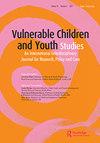Psychosocial aspects in children with transfusion-dependent thalassemia
IF 0.9
Q4 FAMILY STUDIES
引用次数: 0
Abstract
ABSTRACTChildren with transfusion-dependent thalassemia experience stressful conditions related to chronic anemia, repeated blood transfusions, and iron chelation adherence. They are vulnerable to emotional and behavioral problems and psychosocial disturbances. An observational evaluation of psychosocial issues in children with TDTs aged 4–18 using Strengths and Difficulties Questionnaires (SDQ). Psychosocial part in children with TDTs often experiences difficulties in childhood under 10 years old, compared to adolescents (11–18 years) for emotional symptoms and conduct problems. Boys and girls had similar psychosocial problems regarding emotional symptoms, conduct problems, hyperactivity-inatttention, peer relationship problems, and prosocial behavior. In a quarter of cases, they had emotional symptoms, conduct, and hyperactivity-inattention issues, especially in younger children. Interestingly, younger children have more problems than adolescence in peer relations even though they are still under strict parental supervision. Difficulties in emotion, conduct, and hyperactivity would affect their relationship life. Children may try to be accepted by their social environment (prosocial) even though they realize that there are problems in their emotional life and peer relationships. Regular screening of the psychosocial aspects should be followed by counseling because regular transfusion and iron chelation are necessary for long-term management.KEYWORDS: Childtransfusion-dependent thalassemiapsychosocial aspectsemotional and conductpeer relationshipprosocial behavior AcknowledgmentsThe author would like to thank all the staff of the Division of Hematology-Oncology and Residents of Pediatrics at the Faculty of Medicine, Universitas Airlangga/Dr. Soetomo General Academic Hospital, Surabaya, East Java, IndonesiaDisclosure statementNo potential conflict of interest was reported by the author(s).Data availability statementThe data that support the findings of this study are available from the corresponding author upon reasonable request.Ethical declarationResearch ethics were obtained from the Health Research Ethics Committee of Clinical Research Unit (CRU) on Dr. Soetomo General Academic Hospital, Surabaya, East Java, Indonesia under the ethics number 0462/KEPK/VIII/2022.Additional informationFundingThis research did not receive financial assistance from sponsors.Notes on contributorsDiah Kusuma ArumsariDiah Kusuma Arumsari, She is a research assistant in Hematology-Oncology Division, Department of Child Health, Dr. Soetomo General Academic Hospital, Surabaya, East Java, Indonesia. She was doing the conceptualization, methodology, writing the manuscript, data sampling and analysis. Email: dka.diah@gmail.comAndi CahyadiAndi Cahyadi, He is a pediatric hematology-oncologist at Hematology Oncology Division, Department of Child Health, Faculty of Medicine, Universitas Airlangga/Dr. Soetomo General Academic Hospital, Surabaya, East Java, Indonesia. He was doing the conceptualization, methodology, writing the manuscript, and data analysis. Email: andimblitar@yahoo.comMia Ratwita AndarsiniMia Ratwita Andarsini, She is a pediatric hematology-oncologist and also the Head of Hematology Oncology Division, Department of Child Health, Faculty of Medicine, Universitas Airlangga/Dr. Soetomo General Academic Hospital, Surabaya, East Java, Indonesia. She was doing the manuscript supervision, validation, and reviewing the clinical aspect. Email: mia-r-a@fk.unair.ac.idFerry EfendiFerry Efendi, Ph.D, He is the master and doctoral of Community Health Nursing at Faculty of Nursing, Universitas Airlangga, Surabaya, East Java, Indonesia. He was doing the data analysis, reviewing the psychosocial aspect, and the discussion of the results. Email: ferry-e@fkp.unair.ac.idAdwina Nurlita Kusuma WardhaniAdwina Nurlita Kusuma Wardhani, She is a pediatrician in Hematology Oncology Division, Department of Child Health, Faculty of Medicine, Universitas Airlangga/Dr. Soetomo General Academic Hospital, Surabaya, East Java, Indonesia. She was doing the data recording and sampling., Email: adwinanurlita@gmail.comMaria Christina Shanty LarasatiMaria Christina Shanty Larasati, She is a pediatric hematology-oncologist in the Hematology-Oncology Division, Department of Child Health, Faculty of Medicine, Universitas Airlangga/Dr. Soetomo General Academic Hospital, Surabaya, East Java, Indonesia. She is a student in doctoral program of Universitas Airlangga., Email: mariachristinasl@yahoo.comI Dewa Gede UgrasenaI Dewa Gede Ugrasena, He is the Professor of Hematology Oncology Division, Department of Child Health, Faculty of Medicine, Universitas Airlangga/Dr. Soetomo General Academic Hospital, Surabaya, East Java, Indonesia. He was doing the supervision and reviewing the manuscript. Email: ugrasena56@gmail.com输血依赖型地中海贫血儿童的社会心理方面
输血依赖型地中海贫血儿童经历与慢性贫血、反复输血和铁螯合依从性相关的应激条件。他们容易受到情绪和行为问题以及社会心理障碍的影响。运用优势与困难问卷(SDQ)对4-18岁TDTs儿童的社会心理问题进行观察性评估。与青少年(11-18岁)相比,ttd儿童的心理社会部分往往在10岁以下的儿童时期遇到情绪症状和行为问题方面的困难。男孩和女孩在情绪症状、行为问题、多动-注意力不集中、同伴关系问题和亲社会行为方面有相似的社会心理问题。在四分之一的病例中,他们有情绪症状、行为和多动症——注意力不集中问题,尤其是在年幼的儿童中。有趣的是,年幼的孩子在同伴关系中比青少年有更多的问题,即使他们仍然在父母的严格监督下。情感、行为和多动方面的困难会影响他们的关系生活。孩子们可能会试图被他们的社会环境所接受(亲社会),即使他们意识到他们的情感生活和同伴关系存在问题。定期进行心理社会方面的筛查后应进行咨询,因为定期输血和铁螯合对于长期治疗是必要的。关键词:儿童输血依赖型地中海贫血心理社会方面情感与同伴关系亲社会行为致谢作者感谢埃尔朗加大学医学院血液学肿瘤科和儿科住院医师的所有工作人员。印度尼西亚东爪哇泗水Soetomo综合学术医院披露声明作者未报告潜在的利益冲突。数据可得性声明支持本研究结果的数据可根据通讯作者的合理要求获得。伦理声明:研究伦理从印度尼西亚东爪哇泗水Soetomo博士综合学术医院临床研究单位(CRU)健康研究伦理委员会获得,伦理号为0462/KEPK/VIII/2022。本研究没有得到赞助商的经济资助。作者简介diah Kusuma Arumsari diah Kusuma Arumsari,她是印度尼西亚东爪哇泗水Soetomo博士综合学术医院儿童健康部血液肿瘤科的研究助理。她负责概念化、方法论、撰写手稿、数据取样和分析。Email: dka.diah@gmail.comAndi CahyadiAndi Cahyadi,他是一名儿科血液肿瘤学家,在血液肿瘤学部门,儿童健康,医学院,埃尔朗加大学/博士。Soetomo综合学术医院,泗水,东爪哇,印度尼西亚。他负责构思、方法论、撰写手稿和数据分析。Ratwita andarsinia Ratwita Andarsini,她是一名儿科血液肿瘤学家,也是Airlangga大学医学院儿童健康系血液肿瘤学部门的负责人。Soetomo综合学术医院,泗水,东爪哇,印度尼西亚。她负责手稿的监督、验证和临床方面的审查。Email: mia-r-a@fk.unair.ac.idFerry Efendi ferry Efendi,博士,印度尼西亚东爪哇泗水市埃尔朗加大学护理学院社区卫生护理硕士和博士。他在做数据分析,回顾心理社会方面,并讨论结果。Email: ferry-e@fkp.unair.ac.idAdwina Nurlita Kusuma Wardhani, Nurlita Kusuma Wardhani,她是Airlangga大学医学院儿童健康系血液肿瘤科的儿科医生。Soetomo综合学术医院,泗水,东爪哇,印度尼西亚。她在做数据记录和采样。maria Christina Shanty Larasati,她是Airlangga大学医学院儿童健康系血液肿瘤学部门的儿科血液肿瘤学家/博士。Soetomo综合学术医院,泗水,东爪哇,印度尼西亚。她是埃尔朗加大学的博士生。Dewa Gede UgrasenaI Dewa Gede Ugrasena,他是Airlangga大学医学院儿童健康系血液肿瘤学教授/博士。Soetomo综合学术医院,泗水,东爪哇,印度尼西亚。他负责监督和审稿。电子邮件:ugrasena56@gmail.com
本文章由计算机程序翻译,如有差异,请以英文原文为准。
求助全文
约1分钟内获得全文
求助全文
来源期刊

Vulnerable Children and Youth Studies
FAMILY STUDIES-
CiteScore
1.90
自引率
0.00%
发文量
33
期刊介绍:
Vulnerable Children and Youth Studies is an essential peer-reviewed journal analyzing psychological, sociological, health, gender, cultural, economic, and educational aspects of children and adolescents in developed and developing countries. This international publication forum provides a much-needed interdisciplinary focus on vulnerable children and youth at risk, specifically in relation to health and welfare issues, such as mental health, illness (including HIV/AIDS), disability, abuse, neglect, institutionalization, poverty, orphanhood, exploitation, war, famine, and disaster.
 求助内容:
求助内容: 应助结果提醒方式:
应助结果提醒方式:


